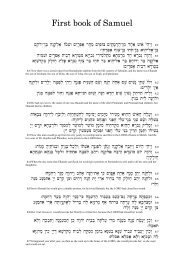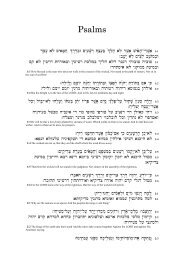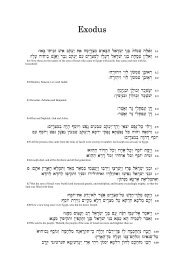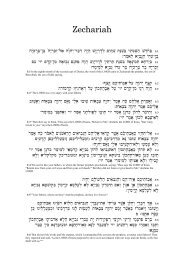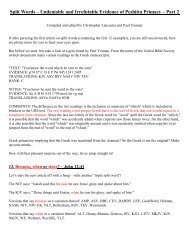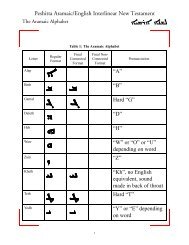ana translation
Untitled - Peshitta Aramaic/English Interlinear New Testament
Untitled - Peshitta Aramaic/English Interlinear New Testament
- No tags were found...
Create successful ePaper yourself
Turn your PDF publications into a flip-book with our unique Google optimized e-Paper software.
110 SUPPLEMENTAL NOTES.<br />
[2 PET. n. 17-19<br />
reading has passed into most editions ;<br />
but Lee has corrected it (from<br />
9), and the American editor (from 11). No trace of e ai/a>0cv appears<br />
in any Greek authority, or in any version.<br />
(6)<br />
In ver. 18, with equal confidence and no less preponderance<br />
of authority, we adopt the correction |*jJQ.t (<br />
= u7re/ooyKa), attested by<br />
the same Syr. codices as the previous instance (except that 11 joins the<br />
later ones 7, 8, 10, and the Polyglot text). Etzel's also goes with these<br />
latter; but Arab, changes places with it, and supports the older text.<br />
So also Harkl. (with vTTTrepoy/ca [sic]<br />
in marg.). The misreading JQjaQ..<br />
,<br />
which Pococke's text and the Polyglots have thus introduced into<br />
the editions (except that of Lee, which follows 9 ;<br />
but including the<br />
American), represents yeXwra (or yeAoioi/), a word quite inappropriate<br />
here, and known neither to any Greek authority or any translator;<br />
while luJcL. is a proper equivalent for the vTre'/aoy/ca of all Greek texts,<br />
as appears from the rendering in both versions of the same word where<br />
it recurs in the parallel passage of Jude (ver. 16) by the cognate<br />
]A*kaJLi. By this latter word the vTrepoy/ca of Deut. xxx. 11 (LXX),<br />
is rendered in the Syr.-Hxp. version [see Masius, Syrorum Peculium,<br />
s.v. **)J_i ].<br />
This is another signal instance of simultaneous variation<br />
in both versions, in rendering of a recurring word, as in case of<br />
avvev(j)xvpvoL (see last Note supr. on ver. 13).<br />
Thus in these two notable instances our text as emended after our<br />
best codices agrees with Harkl.<br />
all<br />
But it would be a mere perversion of<br />
the facts to suggest that these codices borrowed either reading as a<br />
correction from Harkl., the true inference being that Harkl., itself<br />
the earliest witness to the text of our version, on which it is based, here<br />
confirms the testimony of the earliest extant manuscripts of that text.<br />
18. The adject. Aa'i may (as suggested in note to Gr. text, p. 64)<br />
represent the alternative reading do-eXyeias (gen. sing., "lusts of<br />
wantonness" for "wanton lusts"). But the suspicion occurs that the<br />
translator, reading with best Greek text do-eAyeuus, may have mistaken<br />
it for a dat. plur. feminine from<br />
19. As between the rival readings OlliO and Ol (after 3]) in<br />
this verse, there arises no doubt touching the Greek text ;<br />
for *AJ] > OOL^<br />
OllLD \D] and Ol^ \D] AJ*|> OOL^ equally represent w TIS fJTrrjTai (as<br />
all Gr. authorities read). In this connexion Ol-^ (as read by 1 and 2,



